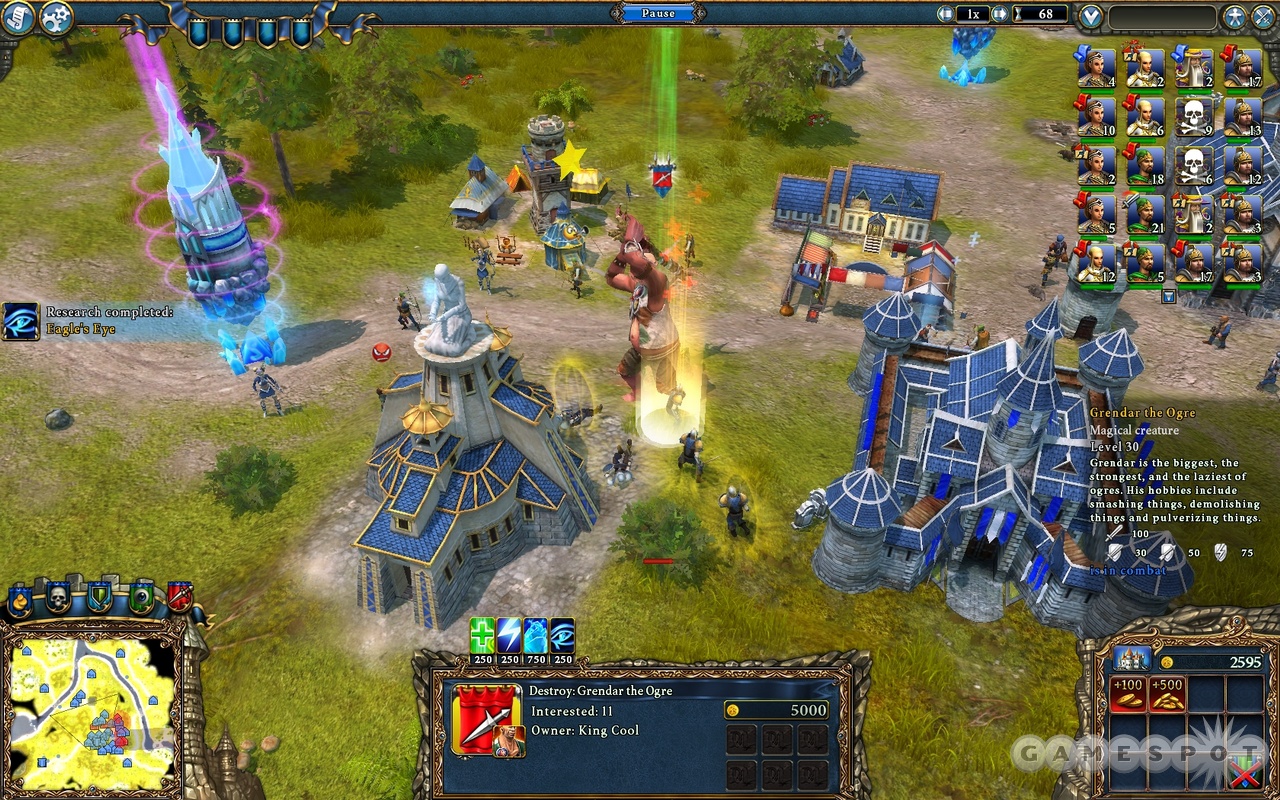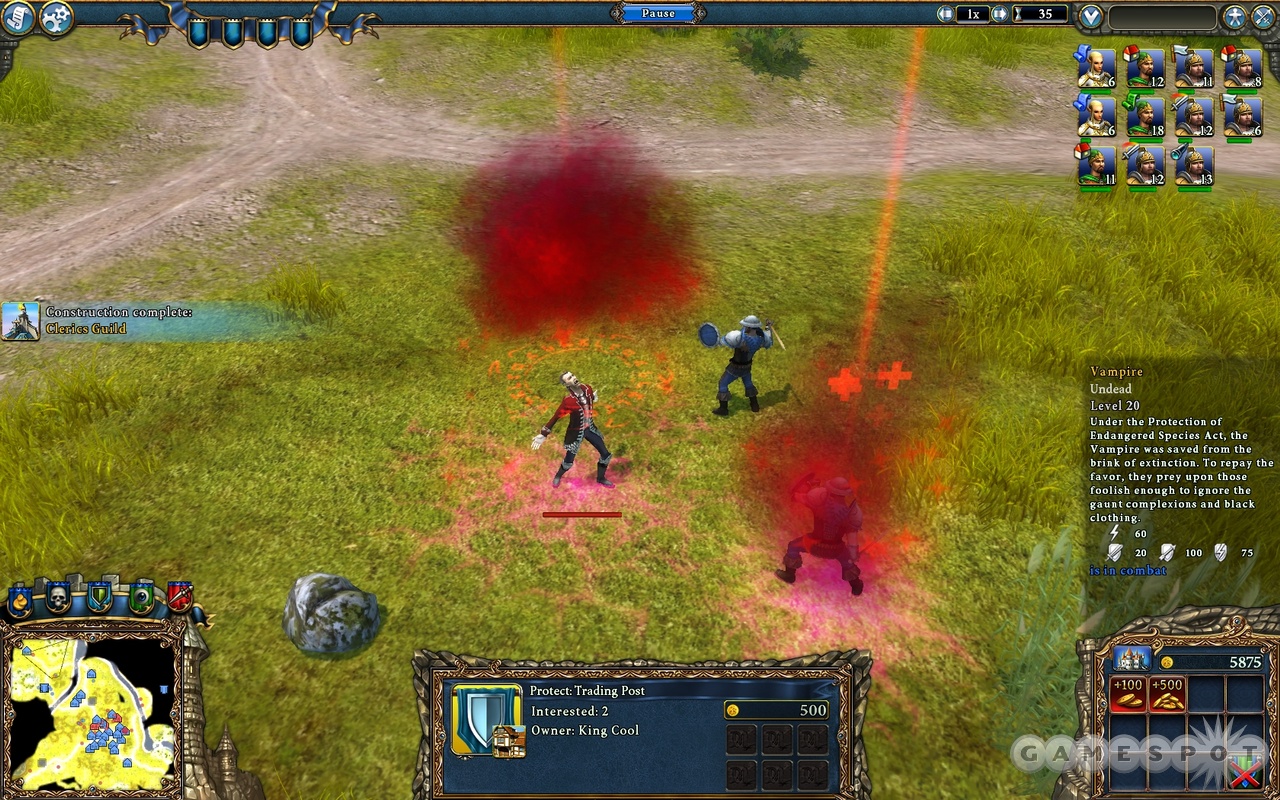Majesty 2: The Fantasy Kingdom Sim has elevated hatred of real-time strategy micromanagement to an art form. This long-long-long-awaited reenvisioning of the nine-year-old cult hit best known today as one of the last games to come out under the legendary MicroProse label yanks managerial duties out of your hands almost entirely and subs in a more ambiguous chain of command where you bribe the great unwashed into doing your bidding. Innovations like this take the 1C Company game only so far, however. Although handing out royal edicts certainly makes you feel more like a king than telling nobodies how to chop wood, formulaic mission design beats you down with an overly repetitive sense of sameness.

As in the first Majesty game, the story and fantasy setting are rather straightforward. In the single-player campaign, you play the last heir to the throne of Ardania, a Tolkien-esque land where vampires spring from graveyards, ratmen rampage through forests, and a demon lord has taken the crown that is rightfully yours. It's an attractive realm, if a bit visually dated, with colorful fantasy artwork that could have been pulled out of a Dungeons & Dragons module from the early 1980s. A good sense of humor and advisor voice-overs provided by a Sean Connery soundalike further add to the lighthearted atmosphere.
The gameplay is also on the old-fashioned side. Missions are structured along traditional RTS lines where base building is concerned. You start with a town castle, and then you move on to erecting a marketplace and trading posts to earn money; tossing up guilds to recruit heroes like warriors, rangers, clerics, and mages; placing guard posts and wizard towers to fend off invaders; and so on. As your town grows, you branch out to research spells, magic trinkets like health potions, and various hero buffs. Heroes gain experience and increase in level. Groups can be organized into adventuring parties to take on tough quests. Taxes roll in regularly from peasants, leaving you with few worries about the treasury once you develop a network of trading posts. If you know your RTS ABCs, you'll be rolling along in no time.
But even though this all sounds standard for a fantasy strategy game, Majesty 2 takes a sharp turn to the left when it comes to how you control units. Instead of giving out typical RTS commands, such as ordering peasants to haul stone, farm a field, or chop wood, duties are automated. There is no resource management, so all you need to do to get a town up and running is crank out buildings, queue up production lines of heroes, and send rangers off to explore the map. Once you have studly dudes in armor wandering around, you focus on quests by setting up flags over target locations and putting up rewards to get jobs done. If you need to take out a bear den, for instance, or a crypt loaded with rampaging undead, or even a rampaging ogre, you simply place an attack flag on top of its location on the map. To defend a building like a trading post, you toss out a defend flag. It's as simple as that. Well, almost. The catch is that you have to bribe your subjects by assigning gold bounties to every flag. This isn't particularly tricky, though, since you can increase rewards in increments of 100 and 500 gold, and the economics of the game generally leave you with a fair bit of handy spending money. Heroes usually respond to a flag within a few seconds, too, so you know pretty quickly if you're offering enough gold or if you need to up the ante.

Finishing quests in this six-degrees-of-separation fashion certainly gives Majesty 2 a unique feel, in that you're always a couple of steps removed from getting jobs done. It also makes you seem more like a real monarch than you do in other RTS games, since not too many medieval kings were out in the fields telling peasants to slaughter pigs. This can be really catchy. Because the game revolves around building bases and tossing out flag commands, you can immediately start bossing everyone around like Henry VIII. For sheer accessibility, this game cannot be beat. But the quests are too repetitive and the controls are too simplistic. Every mission sees you repeating a familiar formula of building up the same old base and taking on the same old quests. All of the variety is superficial. Even though there is a considerable menagerie to fight, including giant wolves, minotaurs, vampires, and imps, you battle each of them in the exact same way. You destroy a wolf den just like you destroy a minotaur pyramid or an impish portal to hell--by hitting it with a flag and offering up a bribe. Additional buildings, abilities, heroes, and even special allies like elves are tossed into the mix over the course of the campaign to liven things up somewhat, and you have the option of playing some murderously tough one-off missions to increase the challenge, but the core of the game never changes. So what starts off user-friendly eventually becomes boring.
In the end, all Majesty 2 offers is an interesting change of pace. The potential of a one-step-removed RTS game remains just as potent today as it was back in 2000, but there still isn't much here aside from the cool bedrock concept. Replay value is minimal, due to the repetitive nature of solo missions and being forced to clear the same old monster dens in the four-player multiplayer maps. So as much as the still-unique design seems fresh and exciting at first for newcomers, and offers up a blast of nostalgia for Majesty veterans, the thrill wears off quickly.